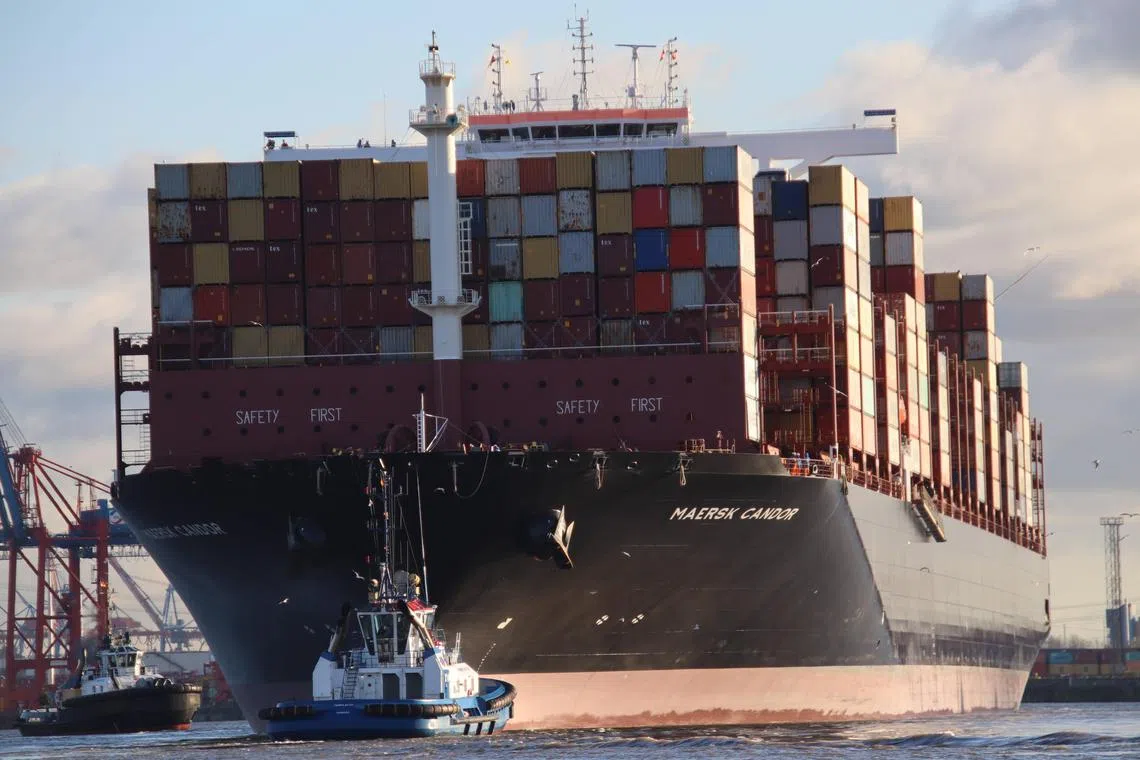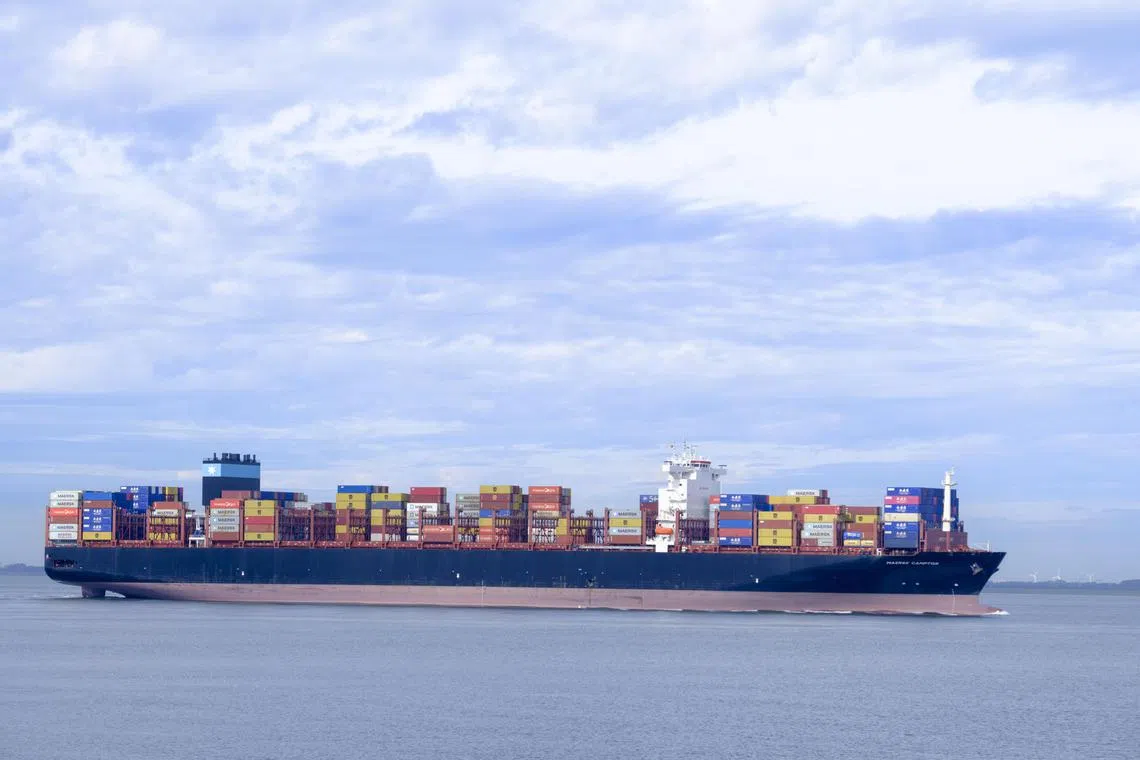Two ships in transit in S’pore suspected of carrying toxic waste; cargo being sent back to Albania
Sign up now: Get ST's newsletters delivered to your inbox

The cargo was loaded onto two vessels, the Maersk Campton and Maersk Candor.
PHOTO: REUTERS
SINGAPORE – Two shipments believed to contain undeclared toxic waste that landed on Singapore’s shores in August are being sent by the authorities here back to where the illegal cargo had come from.
Originally from Albania, the cargo – which a hazardous waste watchdog said contains toxic steel furnace dust – left the country for Italy in July.
Toxic steel furnace dust contains heavy metals such as zinc and lead that can leach when disposed of on land, contaminating groundwater. The harmful dust can lead to serious eye, skin and lung irritation, and even cause cancer.
In Italy, the cargo was loaded onto two vessels, the Maersk Campton and the Maersk Candor, by Danish shipping giant Maersk. The Campton carried 41 containers, and the Candor, 61.
The watchdog, Basel Action Network, said in a statement on Aug 5 that the Maersk ships were headed for Thailand. Singapore appears to have been a transit stop along the way.
The Basel Convention is a UN treaty that criminalises waste trafficking. Under the treaty, the exporter or generator of the waste will have to receive approval from the authorities of the receiving country before the waste is moved.
But Basel Action Network said the countries in the transportation network were not notified about the toxic cargo.
“Albania was never informed about the export by the exporter, the transit states were not informed, and Thailand never received any notification,” said the watchdog in an Aug 19 statement.
At some point en route to South-east Asia, where the dumping of illegal waste from other countries is rife, the Maersk Campton and the Maersk Candor went off the radar for a highly unusual length of time, the watchdog added.
The Maersk Campton’s automatic identification system (AIS) Global Positioning System transponder was switched off on July 31, and it failed to make its scheduled Aug 1 docking in Cape Town, said the network. The Maersk Candor went off the radar between Aug 9 and Aug 19 or so.
The watchdog raised the alarm and alerted Albania, several transit countries and Thailand about the shipments.
On Aug 18, the Maersk Campton is believed to have unloaded its 41 containers in Singapore, said the network. The next day, the containers were transferred to another ship under the Mediterranean Shipping Company that was scheduled to sail to Italy on Aug 21, the network said.
The second ship, Maersk Candor, which carried the remaining 61 containers, docked in Singapore on Aug 24. A search on maritime tracking portal MarineTraffic.com showed that the Maersk Candor was moored at Pasir Panjang Terminal on Aug 25.
In response to queries from The Straits Times, the National Environment Agency (NEA) and the Maritime and Port Authority of Singapore (MPA) said on Aug 26 that they had received information on the two Maersk vessels bound for Singapore carrying containers that reportedly contain undeclared hazardous waste.
“We informed Maersk, which notified us that they are shipping the containers back to the country of export. The Maersk Campton had docked and since departed Singapore, and the Maersk Candor is en route,” said the two agencies.

The Maersk Campton pictured in 2023.
PHOTO: GETTY IMAGES
Singapore became a signatory to the Basel Convention in 1996.
The Republic enacted the Hazardous Waste (Control of Export, Import and Transit) Act and its Regulations to regulate the export, import and transit of toxic waste in accordance with the convention. Any party looking to move such waste here requires a permit from NEA’s Chemical Control and Management Department.
Queried on the content of the shipments, or whether Singapore had conducted tests to determine the levels of heavy metals and other substances in them, NEA and MPA would only say: “In accordance with the Basel Convention, Singapore is facilitating the return of the containers.”
In an Aug 14 letter to Laem Chabang Port in Thailand that was published online, Maersk said the two ships were not scheduled to stop in Thailand.
“Given the speculation regarding the contents of these containers, the company is currently cooperating with the relevant authorities in Singapore and the shipping line on whose behalf we operate, to ensure that these containers are returned to Albania by the best possible means,” wrote Maersk.
Commenting on the vessels going off radar, the shipping company added: “It is not unexpected for some ship owners to temporarily disable AIS signals due to security concerns... These containers have not been declared as containing hazardous waste; if they were to be declared as such, the company would refuse to transport them.”
Ms Penchom Saetang from non-governmental organisation Ecological Alert and Recovery-Thailand said: “Asia is far too often being victimised by global shipments of hazardous wastes, e-wastes and plastic wastes.”
The United Nations Office on Drugs and Crime has said that Malaysia, Vietnam, Thailand and Indonesia have become the top dumping ground in South-east Asia for legal and illegal waste from the United States, Japan, Britain, the European Union and other countries.
Between March and June, Malaysia ports seized hundreds of containers that were suspected to contain illegal e-waste, after getting a tip off from Basel Action Network. At least 106 containers were filled with e-waste.



